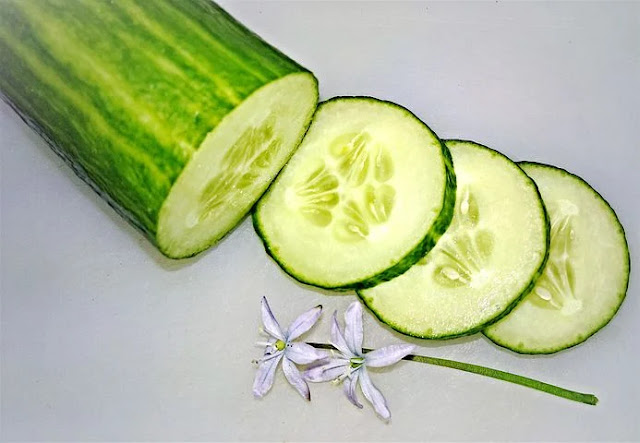10 Health Benefits of Cucumber, Can Lower Sugar Levels
Friday, May 22, 2020
Healty - Cucumber which has the scientific name Cucumis sativus L is a fruit that is often used as pickles. Cucumber is rich in water content to make it feel refreshing when consumed.
Cucumber has many health and beauty benefits because it contains many vitamins such as A, B and C; and minerals, such as magnesium, potassium, manganese, and silica.
Several studies have shown that cucumber has the benefits of antidiabetic potential, antioxidant activity, action to cleanse toxins and wastes, calming effect on skin irritation, and prevention of constipation.
Here are the full benefits of cucumber for your health if you consume it every day quoted from various sources:
Cucumbers are foods that are low in calories but many contain important vitamins and minerals. One raw cucumber weighing 300 grams contains the following nutrients:
Calories: 45
Total fat: 0 grams
Carbohydrates: 11 grams
Protein: 2 grams
Fiber: 2 grams
Vitamin C: 14% of RDI
Vitamin K: 62% of RDI
Magnesium: 10% of RDI
Potassium: 13% of RDI
Manganese: 12% of RDI
Although, usually the portion of eating a cucumber is about one third of a cucumber, so if we consume one third of a cucumber, we will get one third of the nutritional benefits.
In addition, cucumbers have a high water content. In fact, cucumbers consist of about 96% water. To maximize their nutritional content, cucumbers must be eaten without peeling. Peeling it reduces the amount of fiber, and certain vitamins and minerals.
The most dominant nutrient of cucumbers is vitamin K, which is key in maintaining bone health. One cup / bowl of cucumber along with the skin is 20% of the recommended daily target for the fulfillment of vitamin K for the body.
This nutrient is needed for bone formation, and several studies have linked low vitamin K levels with osteoporosis and an increased risk of fractures.
Supports Heart Health
Cucumber contains about 152mg of potassium per cup, which can help lower blood pressure. A study of potassium intake showed that higher intake was associated with lower stroke rates and might also reduce the risk of cardiovascular disease.
Because less than 2 percent of U.S. adults consuming 4,700 mg of potassium recommended per day, eating cucumbers is an easy way to start increasing your potassium consumption.
Protect the Brain from Neurological Diseases
An anti-inflammatory substance called fisetin is found in cucumbers, as well as strawberries and grapes. /
It has recently been suggested that fisetin plays an important role in brain health. Because fisetin has the ability to reduce the impact of age-related neurological diseases on brain function, and that will also help maintain cognitive function in people with Alzheimer's disease.
Supports Hydration
Water is very important for our bodily functions, and plays many important roles in bodily health. Water plays a role in processes such as temperature regulation and circulation of body wastes and nutrients.
In fact, proper hydration can affect everything from physical performance to metabolism. Besides fulfilling most of our fluid needs with drinking water or other liquids, some people might get as much as 40% of their total water intake from food.
Fruits and vegetables, in particular, can be a good source of water in our food.
As reported by Healthline, in a study, hydration status was assessed and food records were collected from 442 children. They found that an increase in fruit and vegetable intake was associated with an increase in hydration status.
Because cucumbers consist of about 96% water, they are very effective in increasing hydration and can help us meet the daily needed fluid needs.
Can Reduce Blood Sugar
Some animal studies have found that cucumbers can help reduce blood sugar levels and prevent some complications of diabetes.
One animal study examined the effects of various plants on blood sugar. Cucumbers are proven to effectively reduce and control blood sugar levels.
Research on other animals induces diabetes in mice and then adds it with cucumber skin extract. Cucumber skin reduces most diabetes-related changes and causes a decrease in blood sugar.
However, current evidence is limited to animal studies. Further research is needed to determine how cucumbers can affect blood sugar in humans.
Fighting Inflammation in the Body and Reducing the Risk of Cancer
lungs
Cucumbers can help reduce the inflammatory response in the body. Cucumbers contain polyphenols called lignans, which have the potential to reduce the risk of cancer and certain cardiovascular diseases.
Cucumbers also contain plant nutrients called cucurbitacins, which have anti-cancer properties. Scientists have shown that the survival of cancer cells can be inhibited by cucurbitacins activity.
Soothing the Skin
clean shine
Using a few slices of cucumber on swollen eyes actually makes a lot of sense. Cucumber porridge mainly consists of water, vitamin C, and caffeic acid, is a natural chemical that has anti-inflammatory properties.
The content of cucumber triggers a calming effect on the skin, and reduces skin irritation and swelling. For this reason cucumbers have long been applied as a home remedy for pimples and sunburn.
Maintain Ideal Body Weight
slim women
Cucumber is very low in calories, which is about 16 calories per cup. The long green fruit also contains fiber on the skin. And foods that contain fiber can help maintain a healthy and ideal weight.
There are many ways you can enjoy cucumbers, which can be consumed raw in salads as an additional food, or even fermented as pickles, and as a vegetable juice. Try to choose cucumbers that are planted organically because cucumbers are ranked 9th most contaminated food by the Environmental Working Group.
Reduces Bad Breath
dry
Bad breath is usually caused by bacteria in the mouth. Fiber and vegetables that are rich in water such as cucumbers can increase your mouth's saliva production, which in turn helps eliminate bacteria that cause odor in the mouth.

